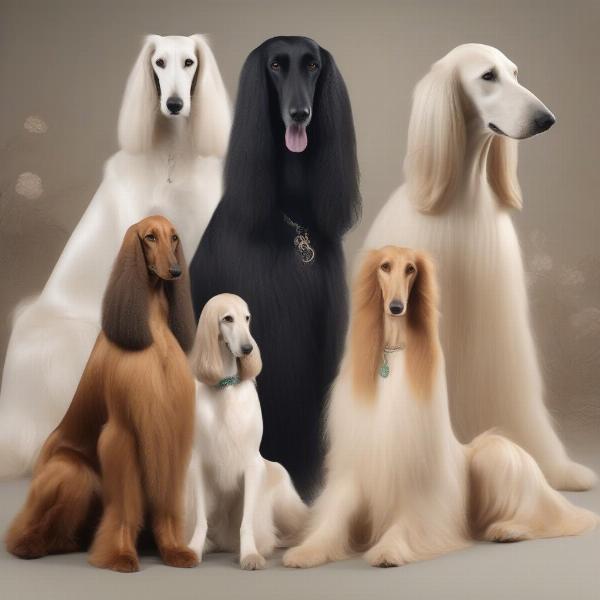Debonair dogs embody a certain charm and elegance, often associated with breeds known for their refined appearance and graceful demeanor. Whether you’re looking for a poised companion for city living or a sophisticated partner for country strolls, understanding the nuances of “debonnaire” in the canine world can help you choose the perfect breed to match your lifestyle. This guide delves into the characteristics often associated with debonnaire dogs, explores suitable breeds, and provides insights into their care and training.
Defining Debonair in the Canine World
What exactly makes a dog “debonnaire”? It’s a combination of factors, including physical appearance, temperament, and even the way they carry themselves. Think of breeds with sleek coats, elegant gaits, and an air of quiet confidence. These dogs often exude a sense of calm and composure, making them ideal companions for those who appreciate a more refined canine presence. They’re not necessarily aloof, but they possess a certain dignity that sets them apart. This doesn’t mean they lack playful energy; rather, their playfulness is often tempered with grace and control.
 Debonair Dog Breeds: Examples of elegant and sophisticated dog breeds.
Debonair Dog Breeds: Examples of elegant and sophisticated dog breeds.
Breeds that Exemplify Debonair
While “debonnaire” is subjective, certain breeds are frequently associated with this quality. Here are a few examples:
- Afghan Hound: Known for their flowing coats and regal bearing, Afghan Hounds are the epitome of canine elegance.
- Borzoi: These graceful sighthounds possess a quiet dignity and a striking silhouette.
- Irish Setter: With their rich mahogany coat and gentle nature, Irish Setters exude both sophistication and warmth.
- Saluki: Another sighthound known for its sleek physique and aristocratic demeanor, the Saluki is a picture of refined grace.
- Whippet: These smaller sighthounds are known for their elegant lines and gentle personalities.
This is not an exhaustive list, and many other breeds could be considered “debonnaire” depending on individual characteristics and personal preferences.
Caring for Your Debonair Companion
While each breed has specific needs, some general principles apply to caring for dogs often considered debonnaire. These dogs typically thrive in environments that offer both physical and mental stimulation. Regular grooming is essential to maintain their sleek coats, and a balanced diet is crucial for their overall health and well-being.
Training with Grace and Poise
Training a debonnaire dog requires patience and consistency. Positive reinforcement methods are often most effective, as these dogs tend to respond well to gentle guidance and praise. Early socialization is crucial to ensure they develop into well-adjusted adults. Focus on building a strong bond based on mutual respect and understanding.
Debonair Dogs: More Than Just Good Looks
While their appearance certainly contributes to their charm, debonnaire dogs offer much more than just good looks. They are often intelligent, loyal companions who bring a touch of elegance and refinement to their owners’ lives. By understanding their unique needs and providing them with the proper care and training, you can ensure a long and fulfilling relationship with your sophisticated canine companion.
Conclusion
Choosing a “debonnaire” dog is about finding a breed that resonates with your personal aesthetic and lifestyle. These dogs offer a unique blend of elegance, grace, and companionship, making them a truly rewarding addition to the right home. Remember to research thoroughly and choose a breed that aligns with your experience and ability to provide the necessary care and attention.
FAQ
- What does “debonnaire” mean in relation to dogs? Debonair dogs are characterized by their elegant appearance, graceful demeanor, and a certain air of sophistication.
- Are debonnaire dogs good with children? It depends on the specific breed and individual dog. Some debonnaire breeds can be gentle and patient with children, while others may prefer a quieter environment.
- Do debonnaire dogs require a lot of exercise? While their energy levels vary, most debonnaire breeds benefit from regular exercise to maintain their physical and mental well-being.
- Are debonnaire dogs difficult to train? With patience and positive reinforcement methods, debonnaire dogs can be trained effectively.
- What are some common health concerns for debonnaire breeds? Each breed has its own potential health issues, so it’s essential to research the specific breed you’re interested in.
- Where can I find a reputable breeder of debonnaire dogs? Research breed-specific rescue organizations and reputable breeders who prioritize the health and well-being of their dogs.
- What is the best way to groom a debonnaire dog? Regular brushing and grooming are essential for maintaining their sleek coats. Consult a professional groomer for breed-specific advice.
Connect with ILM Dog for Expert Advice
ILM Dog is your trusted resource for all things dog-related. We offer expert guidance on breed selection, health and wellness, training, nutrition, grooming, and much more. From choosing the right breed to providing the best possible care, we’re here to support you every step of the way. Contact us today to learn more about how we can help you and your canine companion live a happy and fulfilling life together.
Email: [email protected]
Phone: +44 20-3965-8624
We specialize in providing valuable insights into dog breeds and selection, offering expert advice on health and medical care, and providing guidance on training and behavior. ILM Dog is committed to helping you navigate the world of dog ownership with confidence. Visit us at ILM Dog for more information.